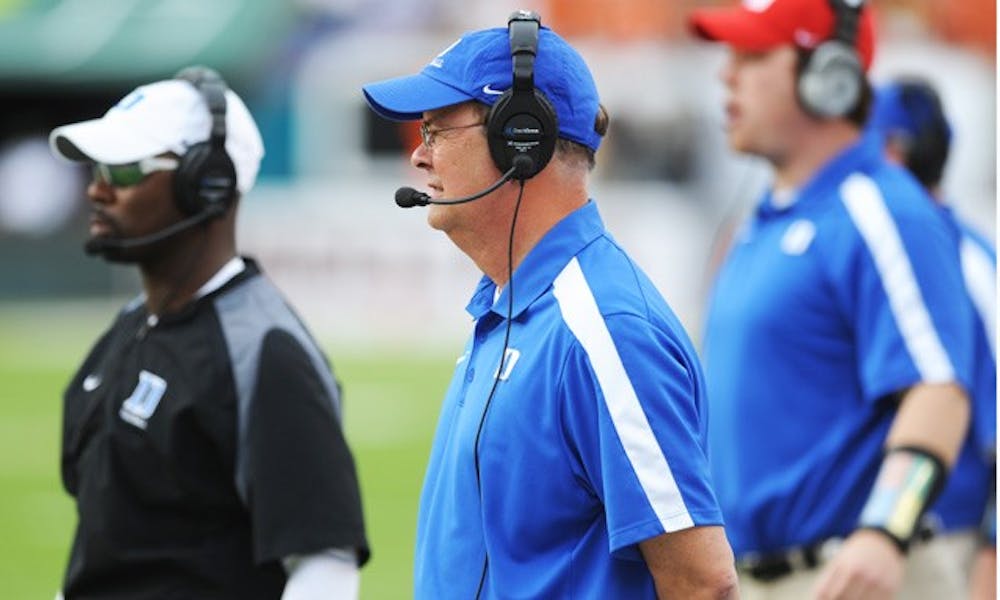A sentiment that seems to be growing in popularity with students and alumni alike is that head coach David Cutcliffe should be on the hot seat. The ignorance of such commentary not only makes me furious but is also a train of thought I would bet has never crossed the mind of any senior university official.
I could not agree more that Cutcliffe’s in-game decision making has been questionable at times in crucial situations. And it is indisputable that his teams have been plagued by poor tackling, execution in the red zone and struggles in the kicking game. Some of this blame falls on the coaching staff and its preparation, but a coach can’t wrap a player up, hold onto a pass in traffic, or knock through a short field goal.
The biggest disappointment with the Cutcliffe Era to this point has to be Duke’s inability to win games when the outcome is still in question late in the fourth quarter. Despite its current 3-7 mark, Cutcliffe described his team at his weekly press conference as “a good team with a bad record.” Had the Blue Devils converted a few more red-zone opportunities or gotten a more consistent performance out of kicker Will Synderwine, they could easily have five wins, and the program would have a shot at its first bowl berth since the 1994 season.
At this point in his tenure at Duke, though, the success of Cutcliffe’s direction cannot simply be measured by wins and losses. Before being critical of his inability to emerge victorious from tight ball games, one must look at a much bigger picture.
From the turn of the century until Cutcliffe’s arrival in the 2008 season, Duke went 10-82 under the combined tutelage of Carl Franks and Ted Roof. In his almost four seasons, Cutcliffe has posted a record of 15-31. Beyond just the substantial increase in win percentage is the fact that the Blue Devils are competitive in the vast majority of its games at this point. Earlier in the decade, the outcome of many conference games had already been decided before the first quarter even ended.
And, perhaps most importantly, after winning just three conference games in those eight seasons, the new coaching staff has led its team to six conference wins. Although playing for moral victories is not part of the program’s philosophy, Duke has been competitive in at least one contest with every ACC school other than Florida State since Cutcliffe took over. Acquiring this confidence is crucial, since beating conference competition will be the only way to reach postseason play.
The defense has been inconsistent at best over the past four campaigns, but the numbers do show that the unit is progressing in the right direction as both total yards and points allowed are lower than last year. But, the real progress with Cutcliffe at the helm has come on the offensive side of the ball, which is not surprising given his track record for mentoring quarterbacks.
After scoring over 30 points just 12 times in eight seasons, the Duke offense has managed that feat 15 times in slightly under four years. Much of this success is a result of improved quarterback play. Under his new coach’s watch, ex-quarterback Thaddeus Lewis morphed into a career 10,000-yard passer after a rocky start in his first two seasons. Current signal caller Sean Renfree has struggled with consistency at times but has also demonstrated the ability to put up points in a hurry.
Another major area where Cutcliffe has had tremendous success is on the business and fundraising side. The first eight seasons of the decade saw just four home games with crowds in excess of 30,000 people. The new regime has put at least that many people in the seats on nine occasions in less than half the time. More than just driving ticket sales, Cutcliffe has also gotten alumni excited about football again, and the results are tangible. The donations have been pouring in at an impressive rate, none more significant than former Duke All-American Bob Pascal’s $6 million donation for the school’s new indoor practice facility.
The improvements that he is making to the fiscal aspects of Duke football would buy Cutcliffe time even if the team wasn’t demonstrating improvement on the playing surface. Plus, you have to remember that the other coach on campus receiving a lot of attention lately had an inconspicuous start to his time in Durham. Mike Krzyzewski had a combined record of 28-47 over his first three seasons at Duke, and letting him stick around turned out to be a pretty good administrative decision.
More than anything else, Cutcliffe is learning something he probably figured out at his previous stops at Tennessee and Ole Miss. Fans are greedy, and the more promise and hope you give them, the more they are going to demand.
Get The Chronicle straight to your inbox
Signup for our weekly newsletter. Cancel at any time.

